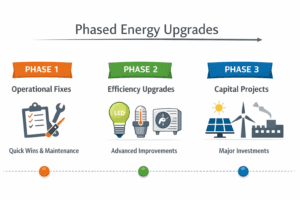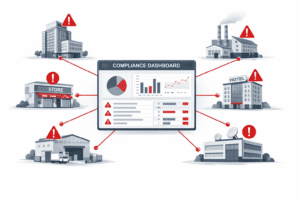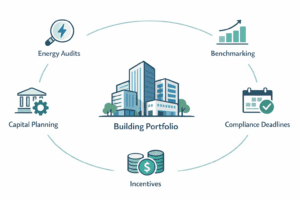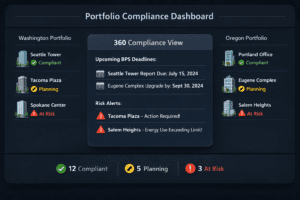Charting the Course: Bold Moves in Energy Compliance and Tech Breakthroughs for 2025
Welcome to the March edition of VertPro® Insights! As we explore the dynamic world of energy in 2025, this issue delves into the latest compliance regulations reshaping our industry. Discover the challenges and creative solutions sparked by new energy mandates. We also bring you the latest on global environmental policy shifts, groundbreaking advancements in renewable energy technologies, and the increasing need for expertise in environmental engineering. Dive into these critical developments with us and gain the essential insights needed to navigate the ever-evolving green technology landscape.
In cities like Boston, Seattle, and Chicago, stricter energy regulations are not just a hurdle; they are an imperative. Property owners and managers must adapt quickly or face hefty fines—sometimes running into thousands of dollars per building. Navigating complex audits and extensive paperwork can be daunting, but there’s a silver lining—a simpler and faster solution exists.
Regional Focus: Updates from Boston, Seattle, and Chicago
- Boston’s Proactive Approach: With the Building Emissions Reduction and Disclosure Ordinance (BERDO), Boston has set rigorous carbon limits, requiring phased compliance. The city is ramping up enforcement in 2025, with more frequent reporting and stiffer penalties.
- Seattle’s Benchmarking Evolution: Seattle is enhancing transparency, extending benchmarking requirements to smaller buildings, and introducing tougher penalties for non-reporting. The city is pushing property owners towards greater efficiency through updated performance standards.
- Chicago’s Rigorous Standards: Facing some of the strictest benchmarks nationwide, Chicago’s new regulations demand more frequent reporting and entail harsher penalties for non-compliance. Property owners need to act swiftly to avoid significant financial impacts.
Strategic Importance of Compliance Audits
Energy compliance audits are essential, not just a checkbox exercise. They provide vital insights into your energy usage, pinpoint inefficiencies, and prevent costly penalties. Regular audits are crucial for risk management, operational streamlining, and enhancing property value through energy optimization.
Introducing the VertPro® Instant Audit Pricing Tool
This tool is a game-changer for property owners looking to bypass bureaucratic hurdles, reduce expenses, and maintain compliance effortlessly. It streamlines the audit process with instant pricing and efficient solutions, allowing you to focus on managing your properties effectively. Below, we break down the major energy compliance challenges of 2025, their implications for you, and how VertPro® can help you stay ahead—saving time, money, and stress.
Key features include:
- Automated Compliance Notifications: Keeps you ahead of deadlines with timely alerts.
- Streamlined Audit Management: Centralizes tracking of energy audits across properties.
- Instant, Transparent Pricing: Provides clear cost projections to aid budgeting and decision-making.
Navigating the tightening landscape of energy regulations in cities like Boston, Seattle, and Chicago is challenging but manageable with the right tools and strategies. By embracing regular audits, proactive upgrades, and innovative tools like the VertPro® Instant Audit Pricing Tool, compliance can transform from a burden into a competitive edge. Don’t wait for penalties to accumulate; take charge of your compliance strategy now. Experience the ease of VertPro® and streamline your compliance process today.
Across the globe, 2025 marks a turning point for property management with the rollout of stringent environmental policies aimed at combating climate change. The U.S. is at the forefront, introducing measures from upgraded energy efficiency standards to enticing incentives for sustainable building practices. For property managers and owners, staying updated on these changes is crucial for compliance, maintaining property value, and cutting long-term costs.
Challenges and Opportunities for U.S. Property Professionals
Federal and state governments are ushering in a new era with rigorous regulations on energy use, waste management, and carbon emissions—transforming how buildings are maintained and operated. These initiatives come with their set of rewards and risks: financial incentives like tax breaks and grants reward compliance, while penalties loom for those who lag behind. Proactive planning is essential to align properties with the latest sustainability standards, optimize efficiency, and maximize cost savings.
Navigating 2025’s Environmental Policy Landscape
Here’s a snapshot of key policies affecting property owners and managers in 2025:
- Stricter Energy Efficiency Standards: To mitigate carbon emissions, updates to the Energy Policy Act and local building codes now demand higher energy performance from properties. Compliance may be challenging but comes with perks like tax incentives for early adopters.
- Carbon Reduction and Net-Zero Goals: Federal and state levels are intensifying efforts towards net-zero emissions. This includes carbon pricing and mandates for renewable energy installations, pushing property managers to evaluate and reduce their carbon footprint strategically.
- Green Building Certifications and Incentives: Achieving certifications like LEED or ENERGY STAR can significantly boost property value and attract financial benefits such as tax credits and faster permitting processes.
- Waste Management and Circular Economy Initiatives: 2025 focuses heavily on waste reduction and sustainable material use. New regulations enforce recycling, composting, and the reduction of single-use plastics, integrating sustainable practices into daily operations.
- Water Conservation Measures: In response to increasing drought conditions, especially in the western U.S., new laws require the installation of water-saving fixtures and systems, essential for both compliance and cost reduction.
The Impact on Property Management
Adapting to these policies is not just about avoiding penalties—it’s about enhancing property value and operational efficiency. Property owners proactive in adapting can leverage financial incentives, improve tenant retention, and reduce operational costs. Conversely, non-compliance could lead to higher expenses and potential asset devaluation.
Future-Proof Your Property Investments
As environmental standards tighten, staying ahead means more than meeting compliance—it’s about securing your investment’s future. At VertPro.com, we equip property professionals with the insights and tools needed to navigate these changes effectively. Visit us to ensure your properties are not only compliant but also competitive in tomorrow’s green economy.
Imagine a future where your property isn’t just cutting energy costs but almost eliminating them. Thanks to rapid advancements in renewable energy technology, this future is within reach in 2025. The growth in solar, wind, and battery storage solutions is revolutionizing property management, supported by enticing government incentives, modernized grid systems, and accessible financing options. Engaging with these developments is not only eco-friendly but a savvy economic strategy.
Seizing Opportunities in Renewable Energy
The renewable energy sector’s expansion offers lucrative opportunities for property owners. Enhanced federal and state policies are propelling the adoption of green energy, while advancements in technology make these options increasingly cost-effective and efficient. By adopting solar panels, integrating battery storage, or engaging in community energy programs today, property owners can enjoy substantial long-term savings and elevate property values. Understanding and leveraging these trends will allow you to adeptly navigate the evolving energy landscape and position your properties optimally for future success.
Key Innovations Driving Renewable Energy in 2025:
- Advanced Solar and Wind Technologies: Solar panels have never been more efficient or affordable. Innovations in photovoltaic cells have significantly boosted their energy output, enabling more power generation with fewer panels. Wind turbines have also evolved, becoming more compact and suitable for urban environments, offering high energy yields and attractive investment returns.
- Enhanced Battery Storage and Grid Modernization: Battery technology has made leaps in capacity, charging speed, and lifespan, allowing properties to store surplus energy efficiently. This capability is crucial for using renewable energy during peak demand times, decreasing grid dependency and cutting utility costs. Additionally, grid modernization, including smart meters and demand-response programs, aids property managers in optimizing energy consumption.
- Financial Incentives and Supportive Policies: The introduction of new tax incentives, rebates, and financing options in 2025 makes it easier and more appealing for property owners to invest in renewable technologies. Moreover, improved net metering policies enable owners to sell excess energy back to the grid, maximizing their financial benefits.
- Community Solar and Virtual Power Plants (VPPs): For properties where installing individual solar systems isn’t viable, community solar projects offer a valuable alternative. These initiatives allow property owners to invest in communal solar farms and benefit from energy credits. VPPs further enhance this by allowing properties equipped with solar and battery systems to contribute to and earn from the grid, bolstering grid stability and generating additional revenue.
Embracing Renewable Energy for Competitive Advantage
The renewable energy landscape in 2025 is ripe with opportunities for property owners looking to reduce costs and boost their market standing. By staying informed and proactive, you can ensure significant savings and a strong competitive edge in a market increasingly leaning towards sustainability. Dive into the renewable energy revolution and position your properties at the forefront of efficiency and innovation.
As we navigate a world where sustainability regulations are becoming more stringent and energy costs are on the rise, the role of environmental engineering in property management is more critical than ever. Property owners and managers are finding that energy efficiency is not just beneficial for the planet—it’s also a key driver of financial savings. The growing demand for expertise in green technologies, energy efficiency, and compliance strategies is reshaping the industry, necessitating a deeper understanding of these areas to stay competitive.
Navigating the Shift Toward Sustainability
The transition to sustainable practices is transforming how properties are managed. Integration of solar panels, smart energy management systems, and other sustainable technologies are redefining operational strategies. More than ever, collaboration with environmental engineers, sustainability consultants, and compliance experts is crucial. These professionals bring essential skills that help enhance property value and reduce environmental impact, making informed decision-making paramount.
Stay Informed and Connected with VertPro.com
For the latest insights into renewable energy technology and energy compliance, connect with us at VertPro.com. We provide the knowledge and tools needed to adapt to these changes effectively.
Essential Green Skills for Property Managers
- Optimizing Energy Efficiency: Mastering energy efficiency is vital. Actions like conducting energy audits, retrofitting buildings with high-efficiency systems, and utilizing smart technologies can drastically reduce energy consumption. Tools that automate and monitor energy usage help maintain optimal performance and minimize waste.
- Implementing Renewable Energy Solutions: The adoption of renewable energy sources such as solar, wind, and geothermal is increasingly crucial. Environmental engineers play a key role in assessing feasibility, designing systems, and overseeing implementation, ensuring energy independence is both practical and cost-effective.
- Utilizing Sustainable Materials and Waste Reduction Strategies: Embracing sustainable building practices involves choosing eco-friendly materials and implementing waste reduction strategies. Collaboration with experts to pursue certifications like LEED and WELL is essential for reducing environmental impact and enhancing property value.
- Strengthening Climate Resilience: With the increasing frequency of extreme weather events due to climate change, incorporating resilience strategies is imperative. Environmental engineers help develop plans that include robust flood defenses, green roofs, and effective stormwater management systems.
- Ensuring Compliance with Sustainability Regulations: Keeping up with evolving sustainability regulations is crucial for avoiding penalties and maximizing incentives. Environmental consultants are invaluable in navigating these changes, providing the expertise needed to maintain compliance through regular audits and proactive upgrades.
The Future of Property Management is Green
The increasing emphasis on sustainability in property management is reshaping the industry. As environmental regulations tighten and renewable technologies advance, adopting green skills is essential for driving efficiency, cost savings, and compliance. The evolving role of environmental engineering is not just about adaptation—it’s about seizing opportunities to lead in a greener, more sustainable future.
As we continue our journey through 2025, this March edition of VertPro® Insights has offered a comprehensive look at the latest advancements and strategies in the world of sustainability and energy management. This issue has not only highlighted the stringent new energy compliance regulations in major cities but also celebrated the rapid expansion of renewable energy technologies. Each article has contributed to a deeper understanding of the critical issues that influence both our environmental and economic frameworks.
In this edition, we also explored the increasing importance of roles in environmental engineering and the innovative applications of green roofs. These topics underscore the necessity of education and urban sustainability initiatives as part of our collective path towards a greener future. Our discussions reflect VertPro®’s unwavering commitment to sustainability and highlight the essential need for continual adaptation and innovation across various sectors.
Looking ahead, we encourage you to remain engaged with these developments and continue utilizing the insights and tools provided by VertPro®. By collectively leveraging our knowledge and resources, we can actively participate in shaping a sustainable world. With VertPro® by your side, each initiative you undertake is a progressive step towards achieving a harmonious balance between efficiency and sustainability.
Here’s to a year filled with growth, innovation, and a steadfast commitment to the future of our planet. Together, we are paving the way for a more sustainable tomorrow.

















